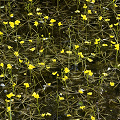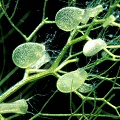Q: Are any carnivorous plants "noxious"?

Utricularia inflata

Utricularia inflata
A: First, let me note that the word "noxious," at least as it means within
the USA, means more than just annoying. This word has legal implications, and is used to indicate a plant that has
some laws in place to govern its transport, sale, and even possibly enforced eradication.
What kinds of attributes merit the designation of
"noxious"? Usually (but not necessarily always) a noxious plant
is non-native, but most importantly it causes some kind of effect that
costs the public money. For example, it may be toxic to cattle or
humans, or it may choke waterways, or decrease crop yields.
Ibicella lutea is a plant which,
while not having any particular status in the USA, is
labelled noxious in Western Australia. It has this designation because it
has long seed pods that get snagged in the feet and coats of livestock, and
can hurt them with its sharb barbs. While probably not carnivorous,
Ibicella lutea has features that merit
its being discussed elsewhere in this FAQ.
The lovely carnivorous plant Utricularia inflata is native to the
southeastern parts of the USA. However, someone (probably a carnivorous
plant enthusiast) let some plants loose in Washington state. Now it is
growing rapidly in the lakes up there, where it is possibly displacing
native species of Utricularia. Homeowners spend money trying to
remove the plant, but are not being very successful. It may be listed as
a noxious weed because it grows into dense mats which can impede boaters
and others who would prefer open water. It would be ironic if the control
methods people use to kill the Utricularia inflata ended up also
killing natives such as Utricularia macrorhiza, U. gibba, U. minor,
U. intermedia, or U. ochroleuca---I doubt this is what the original
introducer of this plant intended!
Also, some carnivorous plant growers have been introducing Aldrovanda into a number of places in the Mid-Atlantic
states of the USA, in particular New Jersey, Virginia, and probably elsewhere. If this plant gets a foothold, you can expect that folks who do not
love carnivorous plants will take some kind of action.
Page citations: Anonymous, Washington State Dept. of Ecology, 2000;
Ceska & Ceska, 1986; personal observation.